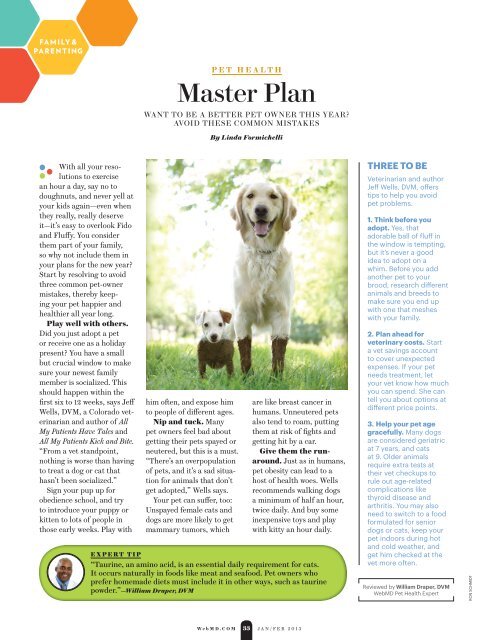MIndy’s CallIng
MIndy’s CallIng
MIndy’s CallIng
You also want an ePaper? Increase the reach of your titles
YUMPU automatically turns print PDFs into web optimized ePapers that Google loves.
FAMILY&<br />
PARENTING<br />
With all your resolutions<br />
to exercise<br />
an hour a day, say no to<br />
doughnuts, and never yell at<br />
your kids again—even when<br />
they really, really deserve<br />
it—it’s easy to overlook Fido<br />
and Flu� y. You consider<br />
them part of your family,<br />
so why not include them in<br />
your plans for the new year?<br />
Start by resolving to avoid<br />
three common pet-owner<br />
mistakes, thereby keeping<br />
your pet happier and<br />
healthier all year long.<br />
Play well with others.<br />
Did you just adopt a pet<br />
or receive one as a holiday<br />
present? You have a small<br />
but crucial window to make<br />
sure your newest family<br />
member is socialized. This<br />
should happen within the<br />
� rst six to 12 weeks, says Je�<br />
Wells, DVM, a Colorado veterinarian<br />
and author of All<br />
My Patients Have Tales and<br />
All My Patients Kick and Bite.<br />
“From a vet standpoint,<br />
nothing is worse than having<br />
to treat a dog or cat that<br />
hasn’t been socialized.”<br />
Sign your pup up for<br />
obedience school, and try<br />
to introduce your puppy or<br />
kitten to lots of people in<br />
those early weeks. Play with<br />
him o� en, and expose him<br />
to people of di� erent ages.<br />
Nip and tuck. Many<br />
pet owners feel bad about<br />
getting their pets spayed or<br />
neutered, but this is a must.<br />
“There’s an overpopulation<br />
of pets, and it’s a sad situation<br />
for animals that don’t<br />
get adopted,” Wells says.<br />
Your pet can su� er, too:<br />
Unspayed female cats and<br />
dogs are more likely to get<br />
mammary tumors, which<br />
PET HEALTH<br />
Master Plan<br />
WANT TO BE A BETTER PET OWNER THIS YEAR?<br />
AVOID THESE COMMON MISTAKES<br />
By Linda Formichelli<br />
33<br />
are like breast cancer in<br />
humans. Unneutered pets<br />
also tend to roam, putting<br />
them at risk of � ghts and<br />
getting hit by a car.<br />
Give them the runaround.<br />
Just as in humans,<br />
pet obesity can lead to a<br />
host of health woes. Wells<br />
recommends walking dogs<br />
a minimum of half an hour,<br />
twice daily. And buy some<br />
inexpensive toys and play<br />
with kitty an hour daily.<br />
EXPERT TIP<br />
“Taurine, an amino acid, is an essential daily requirement for cats.<br />
It occurs naturally in foods like meat and seafood. Pet owners who<br />
prefer homemade diets must include it in other ways, such as taurine<br />
powder.”—William Draper, DVM<br />
W ebMD.COM JAN/FEB 2013<br />
THREE TO BE<br />
Veterinarian and author<br />
Je� Wells, DVM, o� ers<br />
tips to help you avoid<br />
pet problems.<br />
1. Think before you<br />
adopt. Yes, that<br />
adorable ball of flu� in<br />
the window is tempting,<br />
but it’s never a good<br />
idea to adopt on a<br />
whim. Before you add<br />
another pet to your<br />
brood, research di� erent<br />
animals and breeds to<br />
make sure you end up<br />
with one that meshes<br />
with your family.<br />
2. Plan ahead for<br />
veterinary costs. Start<br />
a vet savings account<br />
to cover unexpected<br />
expenses. If your pet<br />
needs treatment, let<br />
your vet know how much<br />
you can spend. She can<br />
tell you about options at<br />
di� erent price points.<br />
3. Help your pet age<br />
gracefully. Many dogs<br />
are considered geriatric<br />
at 7 years, and cats<br />
at 9. Older animals<br />
require extra tests at<br />
their vet checkups to<br />
rule out age-related<br />
complications like<br />
thyroid disease and<br />
arthritis. You may also<br />
need to switch to a food<br />
formulated for senior<br />
dogs or cats, keep your<br />
pet indoors during hot<br />
and cold weather, and<br />
get him checked at the<br />
vet more often.<br />
Reviewed by William Draper, DVM<br />
WebMD Pet Health Expert<br />
RON SCHMIDT


